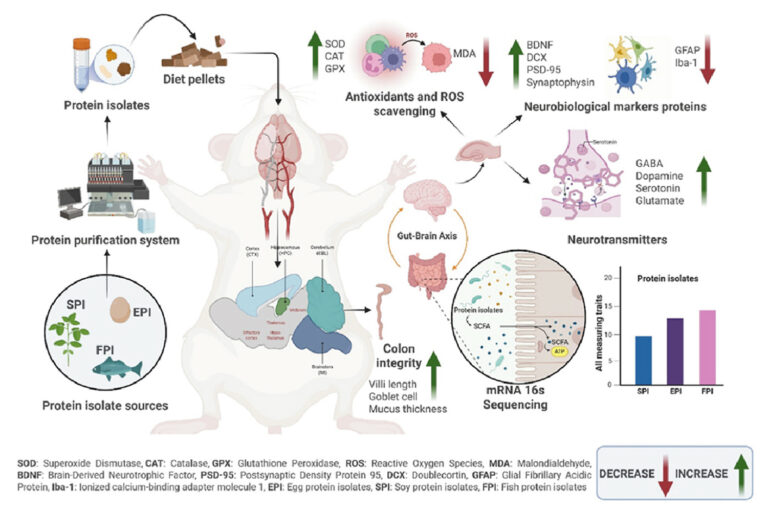Smart Protein Choices for Your Brain via the Gut-Brain Connection
by Anna Sandhu | Oct 25, 2025
Reviewed by Dr. Arun, M.Pharm., PGDRA, Ph.D.

The article studies how different kinds of protein isolate) might affect how the brain works especially thinking, memory, and learning. It also looks at how the gut-brain axis and neurobiological markers might be involved.
How proteins, the gut, and the brain might connect
Proteins are made of building blocks called amino acids, and these help build and repair tissues including the brain. The gut has lots of microbes and different processes that can affect how proteins are digested and how the body uses them. The “gut-brain axis” means the gut and brain talk to each other via nerves, hormones and microbes. The article suggests that different protein isolates might change the gut microbiota and the gut-brain communication, and through that they might alter brain signals or brain health.
What the research found
- The article reviews experiments comparing different protein isolates in terms of how they might influence “cognitive modulation” (thinking/brain-function changes).
- It points out that some proteins might support brain health better than others, perhaps because of how they affect gut microbes and brain markers.
- But it also highlights that during early development the effects aren’t yet well studied.
- It emphasizes that the interplay is complex: the protein source, how it’s processed, how the gut microbiota responds, how the brain markers change all matter.
Key Take-aways
- Different protein isolates have different effects on brain health and thinking.
- The gut-brain axis is an important pathway: what happens in the gut affects the brain.
- Eating protein isn’t just about muscles it could also matter for brain signals and thinking.
- We still don’t know exactly which protein isolates are “best” for cognitive support, or in what amounts, especially in young or developing brains.
- For brain health, it’s not only “eat protein” but “which protein,” “how it interacts with the gut,” and “what age” you are may all matter.
Final Thoughts
Nutrition is deeply connected to brain health not only via calories or general protein but via specific protein types, how they work in the gut, and how they influence brain signals. While we usually think about protein for muscles or body repair, here the focus is on thinking and the brain. For now, it’s a call to look beyond “just enough protein” to “smart protein” and to consider gut health as part of brain health.
More Information: Comparative Assessment of Various Protein Isolates Underpinning Cognitive Modulation: An Interplay of Neurobiological Markers and Gut-Brain Axis DOI: https://doi.org/10.1016/j.crfs.2025.101232
